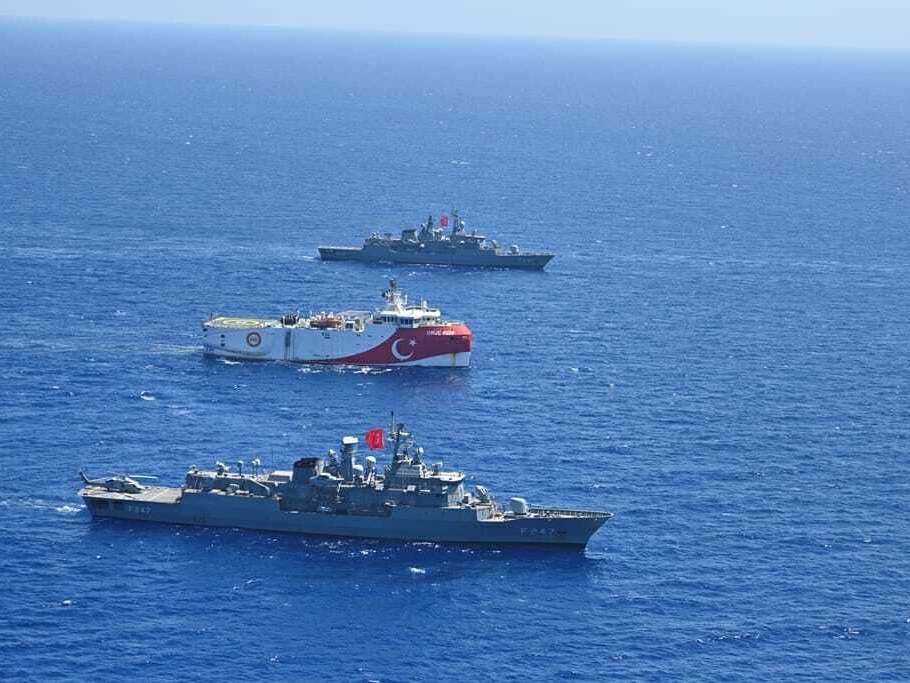Russia to hold live-fire naval drills in eastern Mediterranean, Turkey says
The statement comes amid rising tensions between Turkey and Greece over exploration rights

Your support helps us to tell the story
From reproductive rights to climate change to Big Tech, The Independent is on the ground when the story is developing. Whether it's investigating the financials of Elon Musk's pro-Trump PAC or producing our latest documentary, 'The A Word', which shines a light on the American women fighting for reproductive rights, we know how important it is to parse out the facts from the messaging.
At such a critical moment in US history, we need reporters on the ground. Your donation allows us to keep sending journalists to speak to both sides of the story.
The Independent is trusted by Americans across the entire political spectrum. And unlike many other quality news outlets, we choose not to lock Americans out of our reporting and analysis with paywalls. We believe quality journalism should be available to everyone, paid for by those who can afford it.
Your support makes all the difference.Turkey has announced that Russia will hold live-fire naval exercises in the eastern Mediterranean, amid escalating tensions between Turkey and its coastal neighbours Greece and Cyprus over rights to search for energy resources in the region.
The navigational notice issued late on Wednesday said the Russian exercises will take place between 8 and 22 September and 17 and 25 September in areas of the Mediterranean where Turkish seismic research vessels are operating.
There was no immediate comment from Russia on the exercises, which Turkey announced after the United States said it was partially lifting a 33-year-old arms embargo against ethnically divided Cyprus.
It's unclear why NATO-member Turkey would announce such drills on Moscow's behalf, but the two countries have in recent years significantly strengthened their military, political and economic ties. They are coordinating closely on their military presence in Syria, while Turkey has purchased Russia's advanced S-400 missiles and has broken ground on a Russian-built nuclear power plant on its southern coast.
Turkey has reacted angrily to the US move that it said went against the “spirit of alliance” between Washington and Ankara. It also warned that it would harm efforts to reunify Cyprus, which is split between Turkish Cypriot and Greek Cypriot communities. Turkish officials have also vowed to take steps to guarantee the security of a self-declared Turkish state in the island's northern third.
Turkey's announcement comes at a time of increased friction between Turkey on the one side and Greece and Cyprus on the other over offshore energy exploration rights. Warships from Greece and Turkey have been shadowing each other in recent weeks as Turkish survey vessels and drill ships continue to prospect for hydrocarbons in waters where Greece and Cyprus claim exclusive economic rights.
The US embargo, imposed in 1987, was designed to prevent an arms race that would hinder UN-facilitated reunification efforts for Cyprus. It was directed against the southern, Greek Cypriot part of the island, where Cyprus' internationally recognised government is seated.
Cyprus split in 1974 when Turkey invaded following a coup by supporters of union with Greece. Turkey is the only nation to recognise a Turkish Cypriot declaration of independence and it maintains more than 35,000 troops in the north of Cyprus.
Washington said it was lifting the arms embargo against Cyprus for one year — with the option of renewal — to let it procure non-lethal equipment.
US Ambassador to Cyprus Judith Garber said the embargo lifting had no connection to “valued partner and ally” Turkey, but aimed to strengthen regional security and to “counter malign actors in the region”.
Ms Garber said Washington waived a requirement that Cyprus cease to offer refuelling and other port services to Russian warships, but that it would continue to “encourage” Cypriot government authorities to deny those services.
“We believe that Russia is playing a very destabilising role in the region, especially in Syria,” Ms Garber said.
Russia maintains a sizeable naval presence in the eastern Mediterranean and regularly conducts naval manoeuvres. But the announcement of the latest live-fire drill may be a less-than-subtle message that Moscow remains a major regional player whose influence won't be diminished by Washington's embargo move.
AP
Join our commenting forum
Join thought-provoking conversations, follow other Independent readers and see their replies
Comments